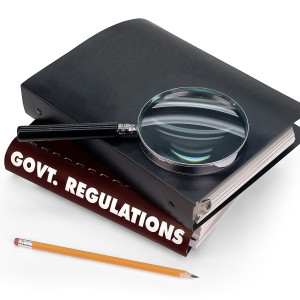The Business Roundtable, an influential association of leading U.S. CEOs working to promote a vibrant U.S. economy through sound public policy, published Reducing Regulatory Overlap in the 21st Century, an initiative of the Roundtable’s “Smart Regulation” project. This policy perspective addresses the problems of regulatory overlap inherent in multiple federal agencies regulating the market activities of American businesses.
Although the Business Roundtable “recognizes that a sound federal regulatory system is critical to protect American consumers and strongly supports this important policy goal,” such a regulatory system creates the “potential for inefficiency” that could impede U.S. economic growth.
Regulatory overlap occurs when multiple agencies at the federal, and often state and local government levels, are actively engaged in similar (if not duplicative) regulatory activities. As an example, the Roundtable report cites the surface transportation sector, where agencies at all levels of American government administer regulations on transportation system safety and security, sharing similar security-focused missions, developing their own standards and rules, and enforcing these rules on the same businesses.
The Roundtable report notes regulatory overlap negatively affects businesses by increasing administrative costs, causing delays, creating policy uncertainty, implementing barriers to entry, and reducing competitiveness in international markets.
So what does the Roundtable recommend to policymakers to address the negative aspects of regulatory overlap?
First, negotiate memoranda of understanding and establish interagency working groups to improve negotiations among regulatory agencies. Second, designate a lead regulator for situations where multiple agencies have responsibility for oversight, with other regulators exercising regulatory and enforcement deference to the primary regulator. Third, conduct joint rulemaking in instances where rules stretch across the jurisdiction of multiple agencies. Fourth, improve communications among regulators and industry actors, including increasing the clarity and availability of guidance in regulatory areas that are prone to jurisdictional overlap. Last, consider the role of state and local regulators and how the recommendations could improve coordination and streamline regulatory measures across all levels of government, e.g., through national associations that promise uniformity among federal, state and local governments.
The Business Roundtable recommendations, although primarily focused on improving policies and enforcement procedures of federal regulatory agencies, does address state and local government regulatory authority, calling into question the role of federalism by encouraging regulatory “uniformity” among all levels of government.
Under federalism, the federal government has certain express or enumerated powers spelled out in the U.S. Constitution. However, the Tenth Amendment of the Constitution provides that “all powers not delegated to the United States by the Constitution, nor prohibited by it to the States, are reserved to the States respectively, or to the people.”
The Tenth Amendment is a basis for the “laboratories of democracy” concept popularized by Supreme Court Justice Louis Brandeis, as it assigns most day-to-day governance responsibilities, including general “police power,” to the state and local governments.
“Laboratories of democracy” is a phrase Brandeis used to describe how a “state may, if its citizens choose, serve as a laboratory; and try novel social and economic experiments without risk to the rest of the country.”
The policy perspective of the influential Business Roundtable is focused on the concept of efficiency. It is not surprising that their idea of harmonizing industry regulation at the federal, state and local levels of government would be the most cost-effective approach to control specific business activities deemed adverse to society. Business associations are effective in facilitating voluntary, self-regulatory development and adoption of national industry standards later cited in administrative rules at all levels of American government. However, administrative efficiency is not the only public policy consideration in regulating business activities.
Federalism allows for the states — and if granted such authority by state governments, counties and local government — to regulate business activities within their political boundaries according to the demands and desires of their citizenry acting through their elected representatives. As “laboratories of democracy,” state and local governments can — and should — experiment with different regulatory approaches to meet their public policy objectives.
Such “novel social and economic experiments,” if they show effective outcomes, may influence the regulatory policies of other states, and potentially federal government approaches to regulating business activities. True, such regulatory experiments can be costly for state residents, as, for example, they will often pay a premium where state business regulations exceed federal business regulations, but that is their citizens’ prerogative under a federalist system of government.
As Susan E. Dudley, director of the George Washington University Regulatory Studies Center sagaciously notes in a recent Forbes.com opinion piece, “Competition could also provide the regulators themselves incentives to maximize the net benefits of their regulations.”
Nevertheless, weakening the constitutionally appropriate use of state and local “police power” — by bowing exclusively at the altar of economic efficiency — is not the only public policy objective for these governments under our federalist system.

